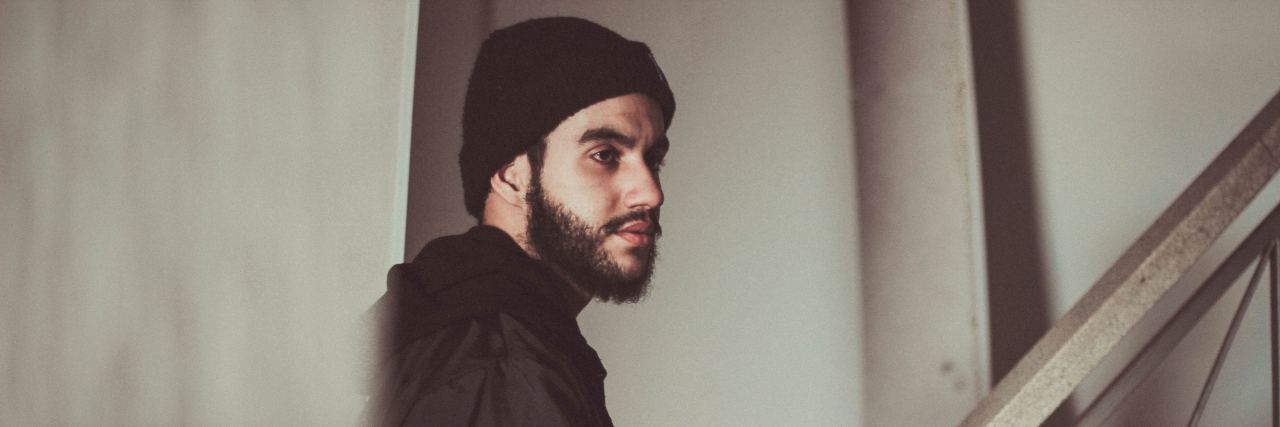Editor’s note: If you struggle with self-harm, the following post could be potentially triggering. You can contact the Crisis Text Line by texting “START” to 741-741. For a list of ways to cope with self-harm urges, click here.
Or if you live with an eating disorder, the following post could be potentially triggering. You can contact the Crisis Text Line by texting “NEDA” to 741-741.
I’m a male in my mid-20s who had a very happy childhood with abundant love from everyone around me, yet I still struggle with depression, anxiety, self-harm and an eating disorder.
My struggles began in my late teenage years. I was excited to begin college studying humanities and journalism. But while I was in college, I developed an eating disorder (undiagnosed at the time). I easily masked it and kept losing weight. After a year of attending college, I became quite hysteric and paranoid. My mood swings were all over — I was happy for an instant and the next moment I was plagued with negative thoughts. I started experiencing severe depression more often, until it began affecting me on a regular basis. Still, I thought I could tackle it on my own and overcome it alone, unaware of the consequences.
I used to purge regularly whenever I ate anything and I drank a lot of caffeinated beverages to keep me activated and energized. I even started to work out more than necessary. This caused my depression to escalate while my eating disorder began to literally fry my brain. I clearly remember feeling so down and hopeless one day; I fantasized about suicide and felt guilty, miserable and worthless at the thought of my mere existence. I don’t know how, but suppressing my anger by killing my hunger affected my self-esteem. I couldn’t control what was raging inside of me, drowning me alive. I felt quite helpless, like this feeling wouldn’t ever go away. That’s when I harmed myself for the first time. And it didn’t stop.
I did a lot of contemplating before I decided to cut for the first time. The sensation somehow managed to seduce me in a way. Whenever I was drained and exhausted, showered by unnecessary thoughts running wild in my mind, cutting became my only solution. It was like a recuperation from my vile self. It became essential — from a want to a need.
At 20, I was diagnosed with an eating disorder, depression, anxiety and impulse control disorder. I was unable to resist my urges to cut. I was doing it almost every day now. I was stuck deep in the swamps of depression. Self-harm became a coping mechanism to deal with my anxiety. What I could never have fathomed before was turning out to be true. It took a lot of time for me to reach out for help due to the shame associated with self-harm.
Self-harm became my drug — I needed it to feel something intense whenever I felt empty or whenever layers of emotions piled on top of each other, making my anxiety worse. But what I couldn’t understand was the craving. It was so tempting that resisting wasn’t easy. Major distractions failed when I got the craving, even on medications. I easily became addicted to it. What started as a coping mechanism was now a full-fledged, vicious, self-destructive addiction.
One of the stigmas I want to eliminate associated with self-harm is the belief that self-harm is “just a phase” or a “teenage thing.” It’s shocks me when people don’t acknowledge self-harm as a mental illness. Self-harm is a coping mechanism that, if continued for too long, can turn into an addiction sort of (at least it did for me). Many adults struggle with self-harm, therefore, it isn’t a limited problem, but a much more progressive problem than most people may think.
I am still on medications and in therapy, working to make recovery possible. By telling my story, I want to encourage everyone who self-harms to please reach out for help. Take baby steps. It isn’t easy, but it is possible. Therapy and medications have helped me a lot (and still are). Shame will do nothing but devour you and give more power to the self-harm. It’s toxically addictive in nature, but it is not a solution.
There will be good days, bad days, worse days, slips and falls — but recovery is possible. One of the most vital things I realized was that I was worth recovery. Stay strong and always know that “this too shall pass.” Recovery takes a serious amount of effort; it takes motivation and a proper support system to carry on even when we fall down. No matter how many times.
Your scars, your body and your mind do not define you as a person. It’s your heart and soul that makes you a true, loving, sincere, strong human being. We all are humans and make mistakes, and we all are worthy and deserve love. Each and every one of us.
If you or someone you know needs help, visit our suicide prevention resources page.
If you struggle with self-harm and you need support right now, call the crisis hotline at 1-800-273-8255 or text “START” to 741-741. For a list of ways to cope with self-harm urges, click here.
Or if you or someone you know is struggling with an eating disorder, you can call the National Eating Disorders Association Helpline at 1-800-931-2237.
We want to hear your story. Become a Mighty contributor here.
Unsplash photo via Alled Vinicius

